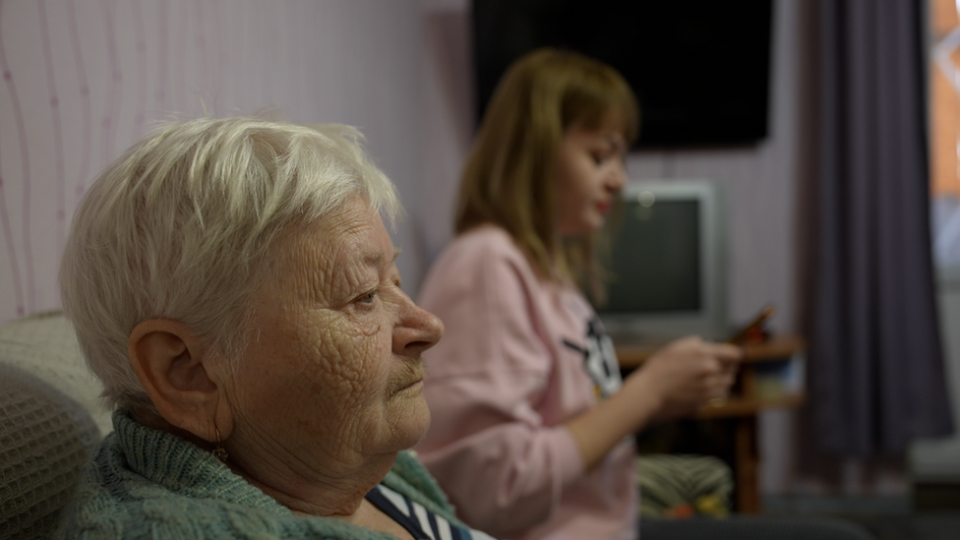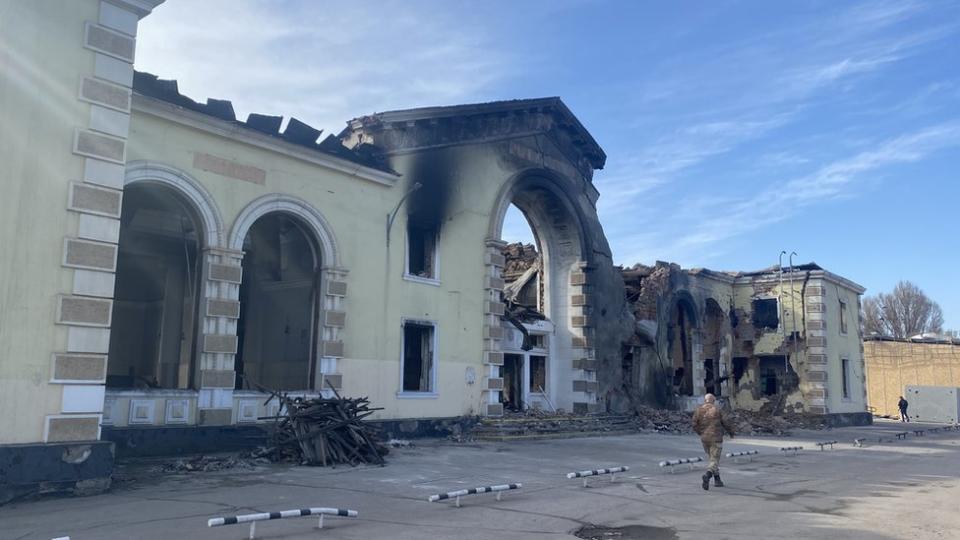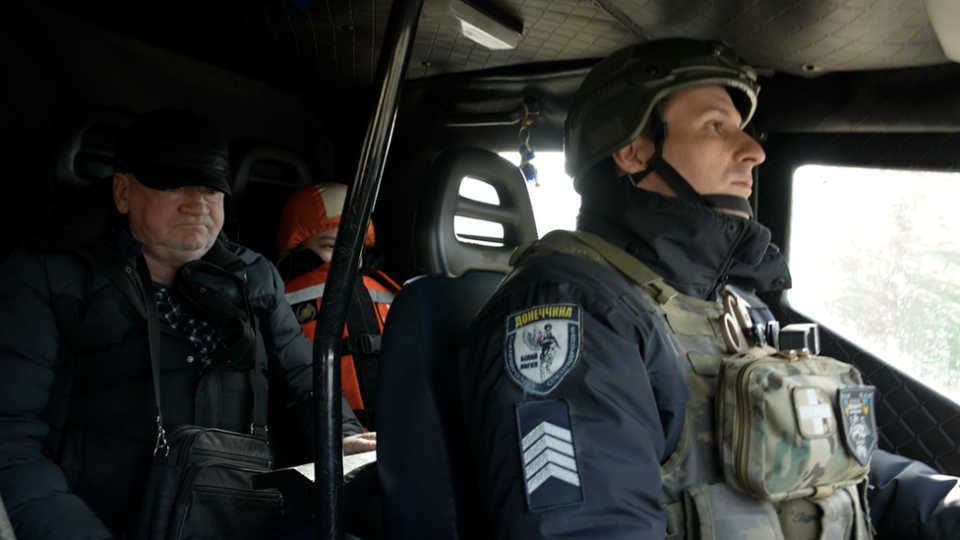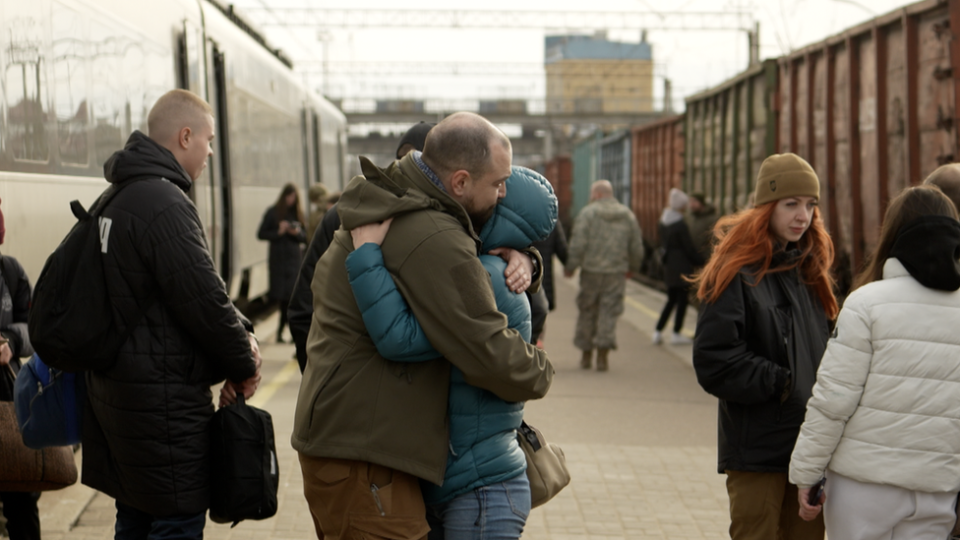In eastern Ukraine, the tide of this war hasn’t just changed – it’s coming in fast.
“We know what’s coming,” says Mariya as she packs up the TV in her flat in Kostyantynivka. She’s having it delivered to Kyiv before making the journey there with her son.
“We’re tired all day [and suffer] moods and panic attacks. It’s constantly depressing, and we’re scared.”
In February, Russia captured the strategic town of Avdiivka. Since then, the invaders have advanced further west, and taken several villages.
Ukraine says its forces are “holding on”. But Russian troops are now attacking in five areas along the 1,100km (700 mile) front line.
And it’s here in the eastern Donetsk region that Ukraine’s defenders are being tested the most.
People in cities like Pokrovsk, Kostyantynivka and Kramatorsk are now facing a fast-approaching front line, and even occupation.
Mariya and her mother Tetyana are finding life increasingly difficult as the Russians advance closer.

Their city is littered with signs of the approaching threat 30km (19 miles) away.
Almost every street has a damaged building. Workers replace gold panels on a church after they were blown off by a missile strike on the neighbouring train station, now destroyed.
Anxiety fills the cold air in this town, once part of the industrial heartland of the former Soviet Union. Russia slowly destroys Ukraine’s cities as it tries to take them. That’s what is feared the most here.
Mariya explains that her mother Tetyana is staying, but she’s confident she’ll follow her eventually.
“I’ve already left twice, what’s the point?” says a defiant Tetyana from her apartment around the corner. She gives us slippers to wear around her home, which explains why it’s spotless.
“It’s scary everywhere. The whole country is on fire.”
Her eyes moisten. It’s one thing to stay in your home for as long as you can, it’s another to risk death or Russian occupation.
While the whole of Ukraine is a war zone, the Donetsk region – along with four others – is a battlefield. When you weave through its dense forest and expansive, rugged terrain, you always feel like you’re approaching the coal face of this conflict.


You can hear heavy fire from as far as 40 km away, so the distant sound of artillery is constant. From one vantage point you can see the erosion of Ukrainian territory.
Plumes of smoke come from the directions of Avdiivka, a town Russia has recently taken, and Horlivka, which it’s controlled since 2014.
Russia is using its size, air superiority and deeper ammunition reserves to keep pushing, at a time when Western military aid to Ukraine is running low or being held up by domestic politics.
Nearby lies a wide valley with several reservoirs. It’s this natural landscape which Ukraine says will allow its forces to “stabilise” the front line.
Perhaps after chaotic withdrawals in the past, Ukrainian generals are willing to temporarily concede territory in the hope it can be liberated in the long term.
Across the front line there is a small minority of people labelled as “Zhdun” by the Ukrainians. It’s a derogatory word which means “waiters”, referring to those who are pro-Russian and waiting to be occupied.
It doesn’t apply to everyone who ignores offers of evacuation. Some just refuse to abandon their homes and have got used to the constant danger.
Valeriy isn’t one of them. After his home in the village of Toretsk was almost shelled twice, he’s taking his belongings and grandson Denys to a pickup point.


With the Russians just 5km away, their neighbours wish them well but still refuse to leave. The pair then board an armoured police vehicle.
“I’ve lived my life already,” the 67-year-old tells us at the other end of his journey in Kostyantynivka. “But I need to save the little one.”
“I worked in the mine for 20 years so I’m not afraid of anything, but I’m worried for him,” he adds.
Denys, who’s 14, nods approvingly. “My last friend left three weeks ago,” he says.
Evacuation from front-line settlements is compulsory for families with children. Despite that 15 children still remain in Toretsk.
Anton Pron from the White Angels police evacuation squad, who helps evacuate people away from front-line towns, tells us the situation is worsening every day.
“There’s constant shelling and artillery,” he says. “The enemy’s aviation is working all the time. The Russians drop bombs only on residential houses.”
These days, the train station in the nearby city of Kramatorsk is the last stop for arriving troops and increasingly, departing civilians laden with bags.


Distant rumbles of artillery serve either as a sobering welcome or a reason to leave. Couples hold long embraces on a platform flanked by freight trains which provide protection in case of a missile strike.
At least 61 people were killed by one here in 2022. Shrapnel marks are still scorched onto the pavement.
We meet Alla, who’s waiting for her train to Kyiv. “A year ago, we thought we’d get help from the West and that our counter offensive would work, but not anymore,” she says.
“People used to believe, but not now.”
Ukraine hopes its eastern lands will one day be somewhere safe to live again. Right now it’s unclear what these departing passengers will be returning to.
Should its Russian invaders gain more momentum in the Donetsk region, the question of where they will stop will be increasingly difficult to answer.
Additional reporting by Hanna Chornous and Scarlett Barter


